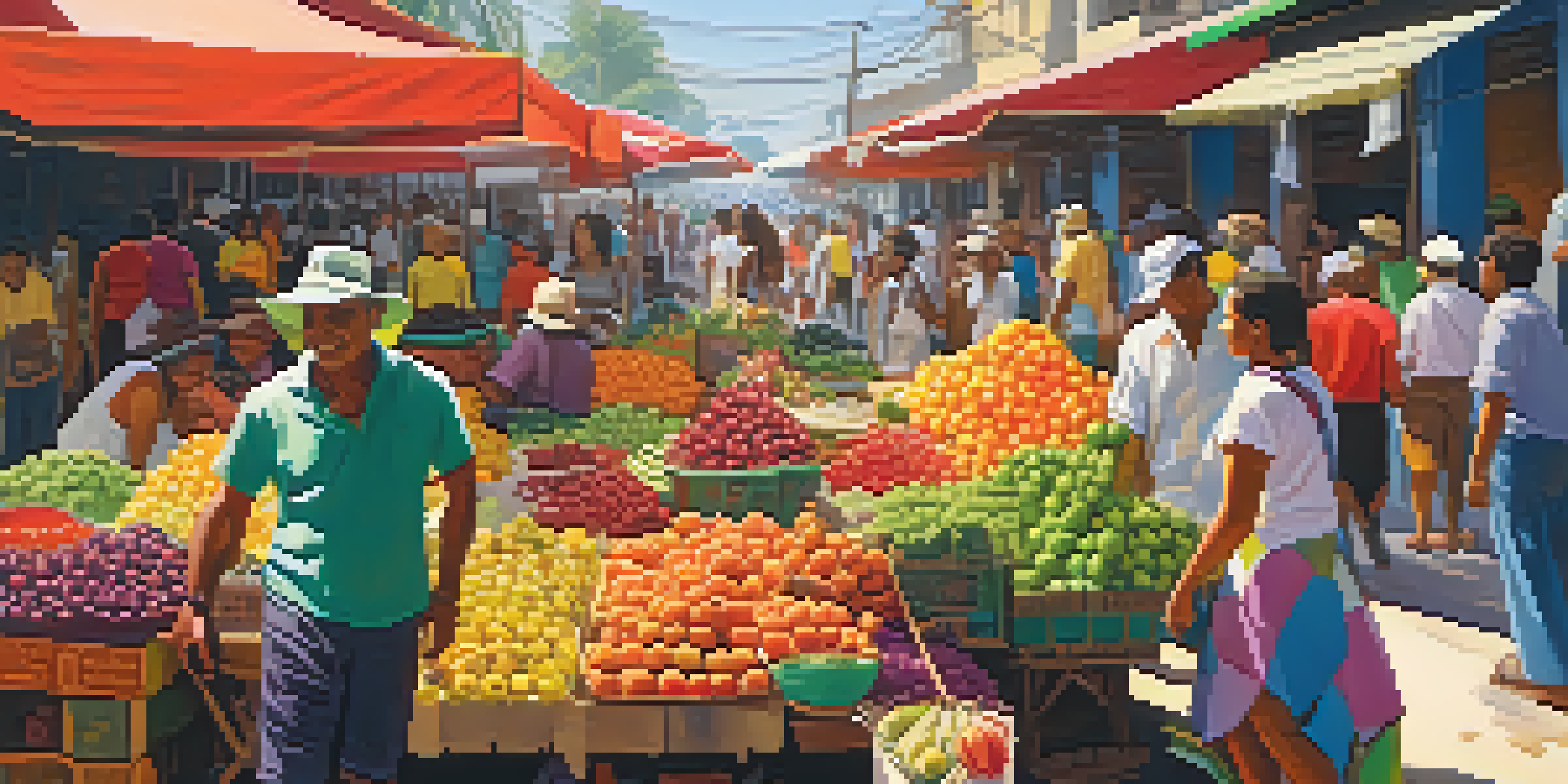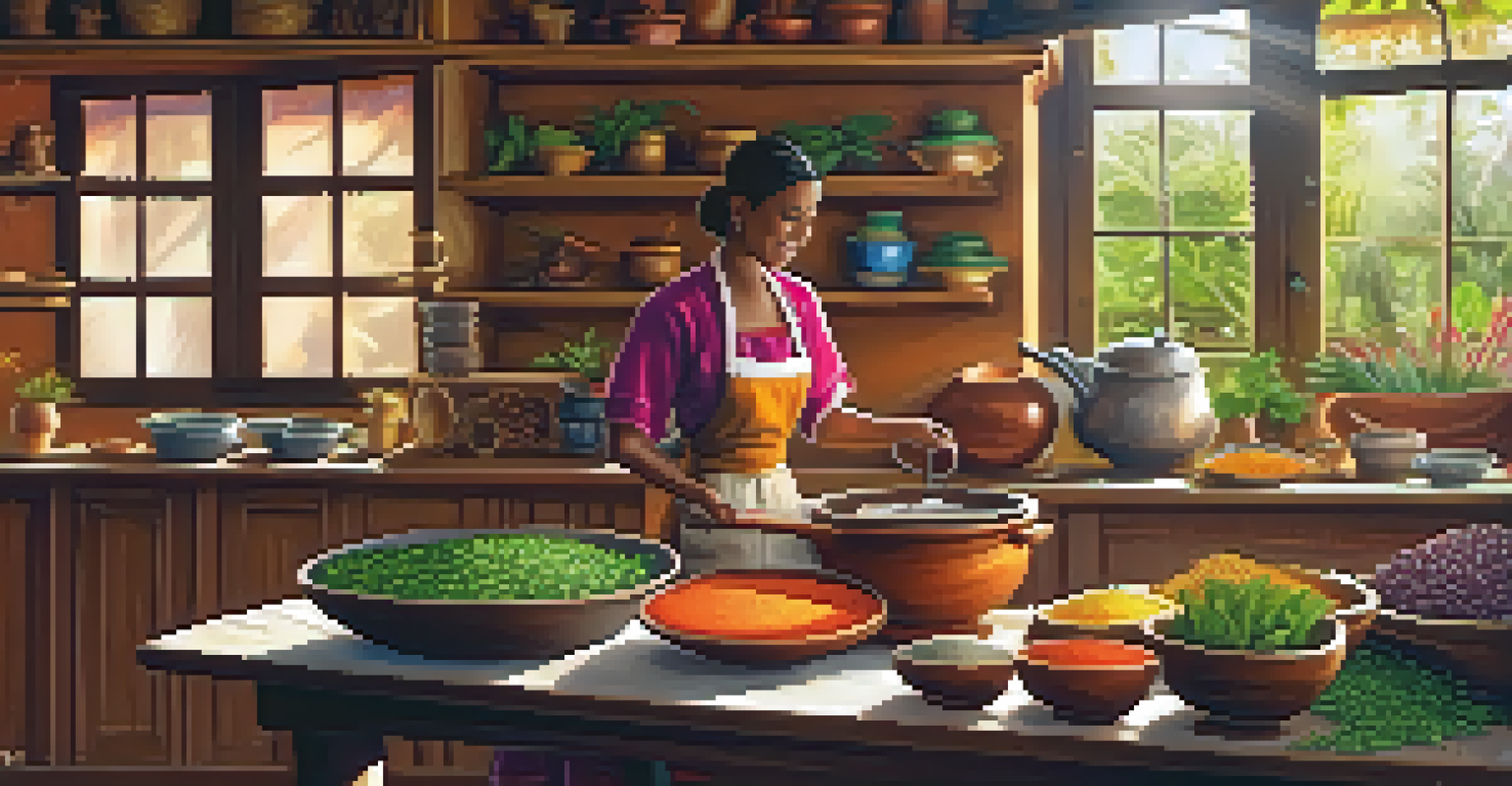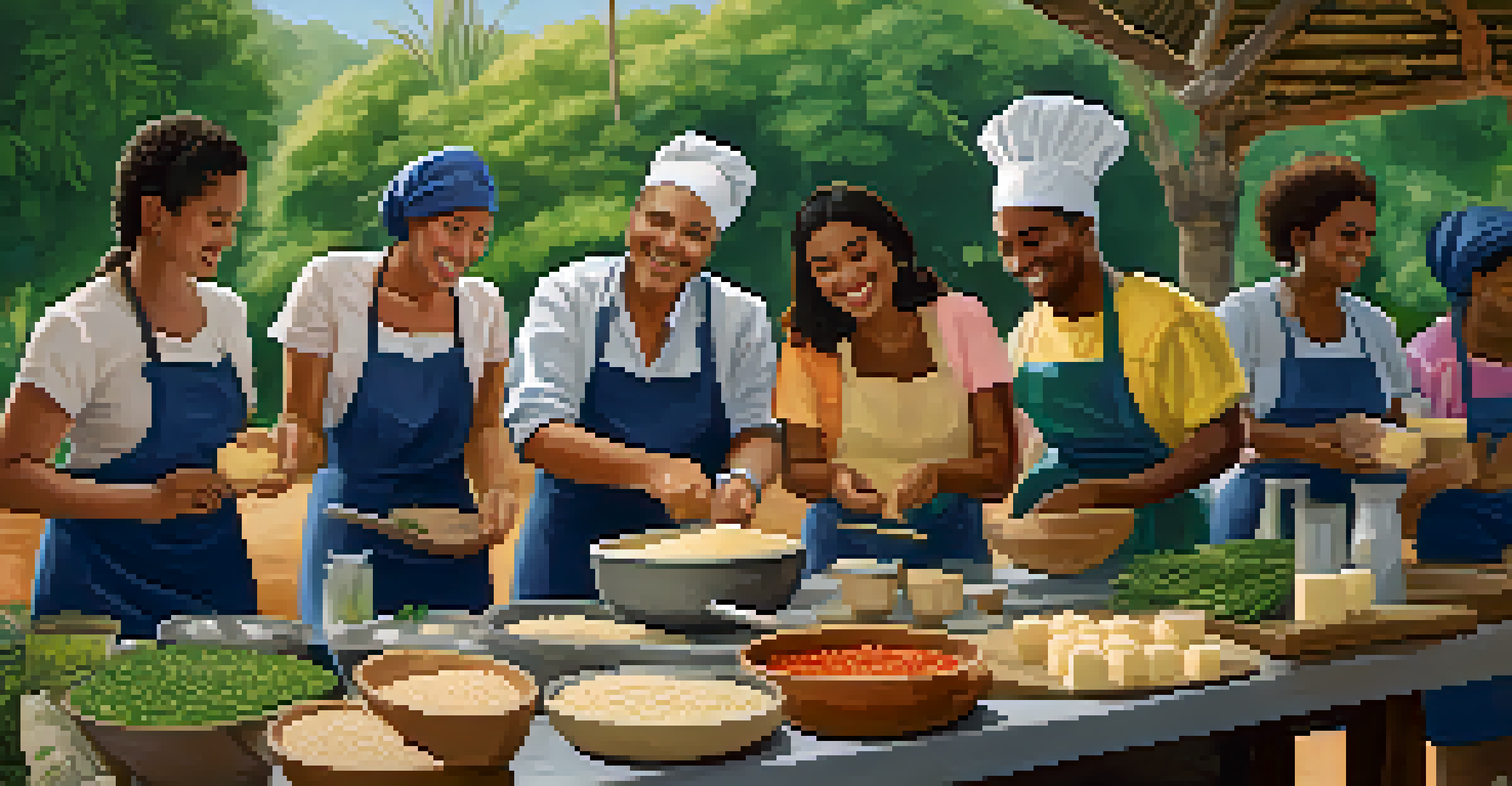Brazilian Cuisine: Culinary Cultural Exchange Programs

What is Brazilian Cuisine and Its Cultural Roots?
Brazilian cuisine is a vibrant tapestry woven from the country's diverse cultures, including Indigenous, African, and Portuguese influences. Each region of Brazil contributes unique flavors and techniques, making the food scene incredibly varied. For example, the Amazon is known for its exotic fruits and fish, while Bahia offers rich, spicy dishes heavily influenced by African traditions.
Food is a universal language that speaks to the soul and connects us all.
The country's food is not just about sustenance; it's a reflection of Brazil’s history and the stories of its people. Every dish tells a tale, from the comforting Feijoada, a black bean stew with pork, to the colorful acarajé, a deep-fried ball of black-eyed pea dough filled with shrimp. Understanding these culinary roots is essential for anyone interested in the true essence of Brazilian cuisine.
Culinary exchange programs play a vital role in showcasing these cultural nuances, allowing participants to experience the food beyond just taste. By engaging in local cooking classes, travelers can learn the traditions and techniques behind beloved Brazilian dishes, fostering a deeper appreciation for the culture.
The Role of Culinary Exchange Programs
Culinary exchange programs are designed to promote cultural understanding through the lens of food. These programs often bring together chefs, home cooks, and food enthusiasts from different parts of the world to share techniques, recipes, and stories. Participants immerse themselves in the local culinary scene, gaining firsthand experience that enriches their understanding of Brazilian cuisine.

For instance, a program might pair Brazilian chefs with international participants for a week of cooking classes, market tours, and traditional meals. This hands-on approach not only teaches participants about Brazilian dishes but also fosters connections and friendships that transcend borders. It’s like creating a global family, united by the love of food.
Brazilian Cuisine Reflects Cultural Roots
Brazilian cuisine is a rich blend of Indigenous, African, and Portuguese influences that tells the story of its diverse cultural heritage.
Moreover, these exchanges often highlight the importance of local ingredients and sustainability in Brazilian cooking. Participants learn not just how to cook but also about the agricultural practices and ethical sourcing that support the vibrant food culture.
Fostering Global Connections Through Food
Food has a unique ability to bring people together, and culinary exchange programs harness this power to foster global connections. As chefs and food lovers come together, they share not only recipes but also personal stories and cultural traditions. This exchange helps build understanding and respect among different cultures, making the world feel a little smaller.
Cooking is like love. It should be entered into with abandon or not at all.
For example, a Brazilian cook might share the history of a dish like pão de queijo, while a participant from another country might share their own cultural bread recipe. Through these exchanges, participants discover similarities and differences that enrich their culinary perspectives. It’s a beautiful dance of flavors and stories.
In essence, these programs offer a platform for dialogue, encouraging participants to explore the connections between their culinary practices and those of Brazil. This not only nurtures friendships but also promotes a broader appreciation for global gastronomy.
Highlighting Regional Specialties in Brazil
Brazil’s culinary landscape is diverse, with each region offering its own specialties that reflect local ingredients and cultural influences. The Southeast is known for its rich cheeses and wines, while the North boasts exotic fruits like açaí and cupuaçu. These regional distinctions are celebrated in culinary exchange programs, where participants can delve into local flavors and cooking methods.
For example, participants might travel to Minas Gerais to learn about traditional cheese-making or visit Bahia to master the art of preparing moqueca, a seafood stew seasoned with coconut milk and palm oil. These experiences provide insights into the regional pride associated with food, showcasing how deeply intertwined cuisine is with local identity.
Culinary Exchanges Foster Global Ties
Culinary exchange programs promote cultural understanding and connections among participants through shared cooking experiences.
Moreover, exploring these regional specialties allows participants to appreciate the diversity of Brazilian cuisine as a whole. It’s an exciting journey that offers new tastes and techniques that can inspire creativity in their own cooking.
The Impact of Culinary Exchange on Local Communities
Culinary exchange programs have a significant impact on local communities in Brazil. By engaging with international participants, local chefs and home cooks not only share their culinary heritage but also gain new perspectives and techniques that enhance their skills. This exchange often fuels innovation, leading to the revitalization of traditional recipes and the creation of new dishes.
Additionally, these programs can boost local economies by promoting agro-tourism and supporting local farmers and producers. When participants engage directly with local markets, they help create a demand for regional ingredients, which can lead to greater economic opportunities for farmers. It’s a win-win situation that celebrates food while supporting community sustainability.
The ripple effect of these exchanges can also be seen in the participants who return home, bringing their newfound knowledge and appreciation for Brazilian cuisine with them. They often share their experiences through social media, blogs, or cooking classes, further promoting Brazilian culture and cuisine worldwide.
Challenges and Opportunities in Culinary Exchanges
While culinary exchange programs offer numerous benefits, they also face challenges that need to be addressed. One significant obstacle is the accessibility of these programs, as they can be costly and may not reach a diverse audience. Ensuring that people from various backgrounds can participate is essential for fostering true cultural exchange.
Another challenge lies in balancing tradition and innovation. While it’s important to honor traditional Brazilian cooking methods, there’s also room for experimentation and modernization. Culinary exchange programs must navigate this delicate balance, encouraging creativity while respecting the roots of the cuisine.
Regional Specialties Enhance Learning
Exploring Brazil's regional specialties in culinary programs allows participants to appreciate local flavors and cooking techniques.
However, these challenges also present opportunities for growth and adaptation. By collaborating with local organizations, culinary programs can create scholarships or community outreach initiatives that make participation more accessible. Engaging with younger generations can also inspire new culinary innovations that respect tradition while embracing change.
The Future of Culinary Cultural Exchange in Brazil
As the world becomes increasingly interconnected, the future of culinary cultural exchange in Brazil looks promising. With a growing interest in global cuisine, more people are eager to learn about and experience the rich flavors of Brazilian food. This trend opens up new avenues for culinary programs to flourish and expand their reach.
Additionally, technology plays a crucial role in shaping the future of these exchanges. Virtual cooking classes and online workshops have emerged, allowing participants from around the world to connect and learn without the need for travel. This digital shift not only makes culinary education more accessible but also allows for a broader exchange of ideas.

Ultimately, the future of culinary cultural exchange in Brazil will hinge on collaboration, innovation, and a commitment to celebrating the country’s unique culinary heritage. By fostering these connections, we can ensure that Brazilian cuisine continues to thrive and evolve, influencing food lovers globally.